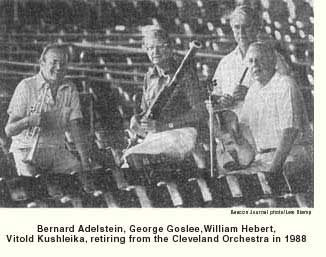 |
 |
|||||||||
|
ARTICLES & REVIEWS
INTERNATIONAL TRUMPET GUILD JOURNAL - June 2018 Bernard Adelstein: A Life in the Service of Music Compiled by Roger Zacks and Stephen Jeandheur On September 30, 2017, the music world lost one of its most beautiful voices. Bernard Adelstein belonged to a very small group of trumpeters who changed the way we play trumpet today. Along with Georges Mager, Harry Glantz, william Vacchiano, Gilbert Johnson, Armando Ghitalla, Roger Voisin, and Adolph “Bud” Herseth, Bernie Adelstein made his personal contribution to modern orchestral playing continue long after his passing. Adelstein’s legacy can be found in a plethora of recordings and in the students of orchestral trumpet playing who, either by personal acquainance or by listening to his recordings, have emulated his sound and style. continue to full ITG Article FORTY YEARS UNDER THE GUN THE PLAIN DEALER Put them together and they’d make a rather odd-sounding quartet. The combination of trumpet, bassoon, piccolo and viola isn’t likely to prompt composers to pull our their quills or audiences to flock to concert halls. But place certain fine players of these instruments alongside 100 other superb musicians and the result is artistry on an inspired level. At the end of the season at Blossom Music Center, four members of the Cleveland Orchestra will retire after a collective 157 years of service..... The retirement of these players will further change the fabric of the Cleveland Orchestra, especially because all were part of the ensemble Szell meticulously shaped into one of the world’s sublime symphonic organizations during his tenure from 1946-70. To celebrate their contribution to the orchestra, three of the retirees will be featured as soloists during the coming weekend’s Blossom concerts under music director Christoph von Dohnanyi. Adelstein will play the prominent trumpet solos in Mahler’s symphony No. 5 on Friday night. Hebert will be soloist in Telemann’s Suite in A minor, while Goslee will join principal clarinetist Franklin Cohen in a performance of Richard Strauss’ Duet-Concertino. Adelstein, whose orchestral career began at age 16 as second trumpeter in Reiner’s Pittsburgh Symphony, said that he remembers his Cleveland audition was easy - and that Szell obviously wanted always to be in control. Szell had guest-conducted the Minneapolis Symphony (now Minnesota Orchestra) while Adelstein was its principal trumpet player. “As I left, when everything was settled, I put my hat on,” said Adelstein, the only Cleveland native among the retirees. “He took my hat and adjusted it. ‘There, that looks better,’ he said.” Adelstein said the Cleveland Orchestra was startling from the moment it began rehearsing a piece on Monday mornings with Szell. “Just to hear the first run-through of a standard work!” remarked Adelstein. “I used to marvel how great the orchestra sounded and wonder what he could possibly say. It was so close to perfection. Obviously, I was wrong. He would dismantle everything, note by note. By Tuesday, you were confused. There was a definite pattern. By Thursday (the morning of the first concert), it would be redone.” And then there were the international tours with Szell. The 11-week tour to the Soviet Union, Poland and Europe in 1965 was filled with artistic triumphs, while the three-festival European tour in 1967 included a performance led by Herbert von Karajan at the Salzburg Festival. ...Undoubtedly, these gentlemen won’t soon forget the excitement of being a part of this special orchestra. The Cleveland Orchestra ended its Blossom Music Center summer Sunday night with a program of showy virtuoso orchestra pieces under the baton of guest conductor Leonard Slatkin. ....and the orchestra ended its summer at full fortissimo throttle with Respighi’s bombastic “Pines of Rome.”.... After the orchestra had finished blowing and sawing its brains out in the brilliant “Pines of Rome”, Slatkin did something nice. He summoned from their seats in the orchestra four longtime members who were playing their last concert before retirement: violist Vitold Kushleika, trumpeter Bernard Adelstein, bassoonist George Goslee and piccolo player William Hebert. Each took a solo bow while the audience cheered lustily. A heartwarming touch. The Cleveland Orchestra that assembles onstage in Severance Hall Thursday night to begin its 71st season will be different in small but important ways from the orchestra that ended the Blossom Music Center Season less than a month ago. As the years go by, veterans of the George Szell era retire, to be replaced by younger faces. Gone this season are principal bassoonist George Goslee, who joined the orchestra in 1943; violist Vitold Kushleika (1944), piccolo player William Hebert (1947) and principal trumpet Bernard Adelstein (1960). Does the departure of four veteran players at one time change the orchestra? Will it sound different? Will it play differently? Adelstein feels that the orchestra was much more regimented under Szell. “We don’t play as tight now as we did. There is more rhythmic freedom if you have a solo. If you had a cadenza solo passage, Szell would always conduct the cadenza. If you asked him not to, he would agree, and wouldn’t do it - but only for one rehearsal. Then he’d be right back doing it again.
|
||||||||||
|
||||||||||
 The BEACON JOURNAL - Sunday, July 17, 1988
The BEACON JOURNAL - Sunday, July 17, 1988